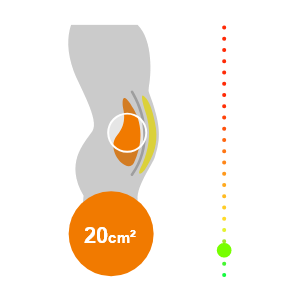Visceral fat is the name given to fatty tissue (adipose tissue) stored within your abdominal cavity - surrounding your organs - underneath the subcutaneous fat layer and abdominal muscle wall.
FitQuest estimates the amount of visceral fat in your body by passing a small electrical signal through your body; a technology known as Bio Impedance Analysis (BIA). From this it estimates your visceral fat level in cm².
Conceptually this value represents an area of visceral fat on a cross-sectional slice through your abdomen. The less visceral fat, and lower this number, the better.

FitQuest provides a gradated gauge of pips indicating the risk factor - with colours ranging from green (healthy) to red (unhealthy). A larger pip indicates the classification of your current measurement.
Our gauge spans a range of 0-200 cm² - though some subjects may have visceral fat estimates much higher than this. The lower the value the better - a healthy range is considered to be between 0 and 30 cm² with your risk increasing thereafter.
Although visceral fat levels typically increase with age, our gauge does not change classification by age or gender - this is because higher levels of visceral fat are deemed unhealthy regardless of age.
Risks
High levels of visceral fat is considered to increase your risk of several potentially life-threatening conditions, including type 2 diabetes, high blood pressure, coronary heart disease, some cancers and strokes along with other problems linked to obesity.
You can reduce your risk by lowering your visceral fat levels.
The best advice to accomplish this is through a combination of a balanced diet, healthy eating and regular exercise.
A small amount of fat is an essential part of a healthy, balanced diet. Fat is a source of essential fatty acids (which the body can't make itself) and helps the body absorb vitamins A, D and E (which are fat-soluble and can only be absorbed with the help of fats).
Too much fat in your diet, especially saturated fats, can raise your cholesterol levels increasing your risk of heart disease. Consuming high amounts of energy, particularly fat and sugars, without burning off the energy through exercise and physical activity, leads to the body storing the surplus as body fat. So your calorie intake needs to be matched to your activity levels.
Current UK government guidelines advise cutting down on all fats and replacing saturated fat with some unsaturated fat.
Its also important to perform regular exercise to maintain muscle bulk and good cardiovascular function.
Related Articles
A collection of useful external resources is provided below:
- NHS - Eat Well Guide
- NHS - Fat - The Facts
- Change4life
- BBC - Burning Visceral Fat
- NHS - Obesity
- NHS - BMI Calculator
Disclaimer
Always seek professional and medical advice before undertaking any changes to your fitness regime, training or diet. The information we provide (in our results, applications and reports for example) is intended as a guide only (not a clinical assessment). Targets are based on averages for individuals matching your age range and gender. You should always discuss personalised targets with your doctor, trainer and dietician.
